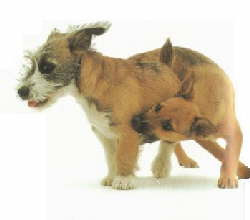Biting and mouthing are normal behaviors for puppies. Dogs don't have hands so they investigate objects and their environment with their mouths.
• To a curious puppy, everything about this big world is brand new and exciting. He learns as he goes along.
• Playing is also a normal learning behavior for puppies, especially play-fighting. Play-fighting with littermates and other animals develops reflexes, coordination and physical skill. It also helps them develop social skills and teaches them how to interact positively within their canine society, their "pack."
• A dog's ability to control the force of his biting is called "bite inhibition." It's a critically important skill that every puppy needs to learn, the earlier the better. At first, they don't know their own strength nor how sharp their little teeth really are. Puppies learn to control the force of their biting from the reactions of their mothers and littermates during play and especially play-fighting.
• We can teach puppies about bite inhibition, too, but some of the methods most often recommended aren't effective. Mother dogs' methods, however, are very effective, often more so than ours. I believe this is because they're speaking to their pups in the language they understand best - dog language!
• Puppies respond to dog language in a very powerful, instinctive way. We can take advantage of that by copying a mother dog's actions and using them for ourselves.
• The idea of using mother dog's natural training techniques isn't new. Respected trainers like Carol Lea Benjamin have been using them for years. To understand these methods, let's take a look at a typical mother dog disciplining her brood. We'll use my Heather (Chow) and her four rowdy puppies as an example.
• When a playful puppy bites Heather hard enough to hurt, she squeals in shocked indignation. The puppy, surprised at her reaction, usually hesitates a moment, unsure of himself, then tries to bite again. Heather yelps even louder this time and whirls on the puppy, growling, showing her teeth and scowling at him fiercely. Then she turns her back on him and storms away, completely ignoring him and any further attempts to get her to play. A smart puppy picks up her clear message quickly: "if you can't play nice, I won't play with you at all!"
• If the puppy persists or doesn't take the hint, Heather doesn't fool around. With a menacing growl and using her teeth, she grabs him by the scruff of his neck and gives him a shake. If he sasses back, she gives him another little shake, tougher this time. She doesn't let go of the pup till he's acknowledged her authority (in dog language) by relaxing his body, laying his ears back and keeping still for a moment. Heather disciplines especially obnoxious puppies by knocking them over with her paw and pinning them to the ground, growling angrily and pinching them with her teeth. The puppies shriek but they're not really hurt. She doesn't let them up again until they relax and lie still. After the correction, the puppy shakes his fur back into place and goes off in search of a playmate with a better sense of humor.
• The next time your puppy bites you, scream "OW!" in a high- pitched voice. Exaggerate a little. Then refuse to play with him or pay attention to him for a few minutes. If he doesn't get the message, give him a little scruff shake and scold him in a low-toned, threatening voice. You can exaggerate a little on that, too! Sound meaner than you really are. For puppies that just won't quit or seem to get wilder with every correction, flip them over on their backs, scold them in that same low, scary voice (growling) and gently but firmly, hold them in that position until they stop struggling.
• We sometimes give puppies the wrong message about biting by some of the games we play with them. Wrestling and tug of war can encourage a puppy to bite and make it hard for him to distinguish when it's okay to use his teeth and when it's not. To make it easier for your puppy to learn good manners, it's a good idea to avoid these games.
• Puppies seem to learn a great deal about bite inhibition and authority between five and eight weeks of age through play with their mothers and littermates. This is an especially good reason not to buy very young puppies. Puppies that were acquired earlier need to be taught these important things by their owners. They might require a little more intense use of Heather's methods than puppies that stayed with their litters longer. Puppies that receive little or no training in bite inhibition, either from their mothers or their people, may grow up to develop behavior problems.



